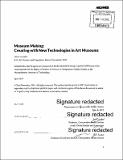| dc.contributor.advisor | Ian Condry. | en_US |
| dc.contributor.author | Gonzalez, Desi (Desiree Marie) | en_US |
| dc.contributor.other | Massachusetts Institute of Technology. Department of Comparative Media Studies. | en_US |
| dc.date.accessioned | 2015-07-31T19:12:48Z | |
| dc.date.available | 2015-07-31T19:12:48Z | |
| dc.date.copyright | 2015 | en_US |
| dc.date.issued | 2015 | en_US |
| dc.identifier.uri | http://hdl.handle.net/1721.1/97995 | |
| dc.description | Thesis: S.M., Massachusetts Institute of Technology, Department of Comparative Media Studies, 2015. | en_US |
| dc.description | Cataloged from PDF version of thesis. | en_US |
| dc.description | Includes bibliographical references (pages 151-155). | en_US |
| dc.description.abstract | Hackathons, maker spaces, R&D labs: these terms are common to the world of technology, but have only recently seeped into museums. The last few years have witnessed a wave of art museum initiatives that invite audiences-from casual visitors to professional artists and technologists-to take the reins of creative production using emerging technologies. The goals of this thesis are threefold. First, I situate this trend, which I call "museum making," within two historical narratives: the legacy of museums as sites for art making and the birth of hacker and maker cultures. These two lineages-histories of art-based and technology-based creative production-are part of a larger participatory ethos prevalent today. A second goal of this thesis is to document museum making initiatives as they emerge, with an eye to how staff members at museums are able to develop such programs despite limited financial, technological, or institutional support or knowledge. Finally, I critically examine how museum making may or may not challenge traditional structures of power in museums. Museum making embodies a tension between the desire to make the museum a more open and equitable space-both by inviting creators into the museum, and by welcoming newer forms of creative production that might not align with today's art world-and the need to maintain institutions' authority as arbiters of culture. My analysis draws on a wide range of fields, including sociology, educational theory, media studies, museum studies, and art theory. This thesis is informed by extensive fieldwork conducted at three sites: the Los Angeles County Museum of Art's Art + Technology Lab, a program that awards artist grants and mentorship from individuals and technology companies such as Google and SpaceX; the Metropolitan Museum of Art's Media Lab, an innovation lab that invites members of New York's creative technology community to develop prototypes for and based on the museum experience; and the Peabody Essex Museum's Maker Lounge, an in-gallery space in which visitors are invited to tinker with high and low technologies. | en_US |
| dc.description.statementofresponsibility | by Desi Gonzalez. | en_US |
| dc.format.extent | 155 pages | en_US |
| dc.language.iso | eng | en_US |
| dc.publisher | Massachusetts Institute of Technology | en_US |
| dc.rights | M.I.T. theses are protected by copyright. They may be viewed from this source for any purpose, but reproduction or distribution in any format is prohibited without written permission. See provided URL for inquiries about permission. | en_US |
| dc.rights.uri | http://dspace.mit.edu/handle/1721.1/7582 | en_US |
| dc.subject | Comparative Media Studies. | en_US |
| dc.title | Museum making : creating with new technologies in art museums | en_US |
| dc.title.alternative | Museum making : creating with emerging technologies in art museums | en_US |
| dc.title.alternative | Creating with emerging technologies in art museums | en_US |
| dc.title.alternative | Creating with new technologies in art museums | en_US |
| dc.type | Thesis | en_US |
| dc.description.degree | S.M. | en_US |
| dc.contributor.department | Massachusetts Institute of Technology. Program in Comparative Media Studies/Writing | en_US |
| dc.identifier.oclc | 914473036 | en_US |
